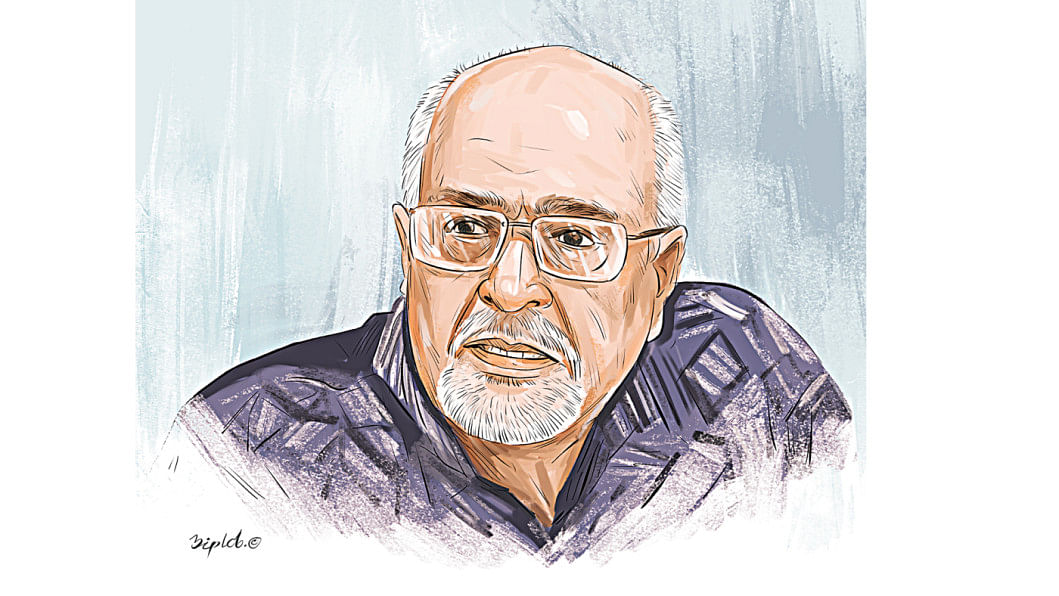“What’s changed since the fall of the dictator?" Debapriya asks

Debapriya Bhattacharya, a distinguished fellow of the Centre for Policy Dialogue (CPD), has raised questions about ensuring transparency in the formulation of economic policies and dialogue on reform measures by the interim government.
At a pre-budget discussion jointly organised by NTV and the Federation of Bangladesh Chambers of Commerce and Industry (FBCCI) last evening, he cited the issuance of an ordinance on tax reform.
Bhattacharya, who headed a panel that prepared a white paper on the state of Bangladesh's economy and submitted it to the chief adviser on December 1 last year, said they had recommended separating tax policy-making from administration, as this creates a conflict of interest.
A new ordinance was issued on May 12 that sought to dissolve the National Board of Revenue (NBR) and form two divisions — one for policy-making and another for implementation.
However, the government had to backtrack, as overseas trade and revenue activities suffered amid massive protests by revenue officials, who demanded the repeal of the ordinance and the development of the NBR as a separate and specialised institution.
The government this week promised to amend the law.
"When you do not follow the reform committee's suggestions fully and proceed to implement it (the new law) without any discussion, you are supposed to face a sorry consequence, which you have faced," he said, referring to NBR Chairman Abdur Rahman Khan.
"These consequences will arise even if you do the right thing without engaging in dialogue."
He gave another example, saying the stock market is now truly in a moribund state and has gone into the intensive care unit.
If the Bangladesh Securities and Exchange Commission wants to reform the stock market without consulting stakeholders, it will not be possible to complete it, he said.
"If there is no openness to dialogue, even a right approach can turn into a wrong one."
"You must engage in discussion and give people the opportunity to speak. Otherwise, what changes have come after the fall of a dictatorial government?" he questioned.
Citing the budget for the upcoming fiscal year, he said he found no difference in the formulation of fiscal measures.
The interim government has revised it, but there has been no structural change, said Bhattacharya, also a convenor of the Citizen's Platform for SDGs.
"Where are you giving the incentives? Where are you granting the exemptions? People do not know. The same lack of transparency that existed during the tenure of the previous dictatorial government is seen now."
He said the mega projects were overvalued. "Where have you reduced it?" he questioned.
However, he said the interim government should be partially thanked for the rising trend in foreign exchange reserves, stability in the foreign exchange market, and the gradual easing of inflation.
Nonetheless, a clear roadmap for the economy is absent.
"There is no visible discussion on employment generation," he said.
"What is the government's stance on disparity? This government must prove how it is different from the previous one and what it has done differently."
"Where is the roadmap for the economy? Will investors plan based on just your six-month plan? This government is legal, but it is not elected. What guarantee is there that the future government will continue its policies?"
At the event, Anisuzzaman Chowdhury, special assistant to the chief adviser, did not respond directly to Bhattacharya's comments.
He said reform is very tough during an economic crisis, which Bangladesh is currently facing.
On the other hand, those opposing the reforms are well-organised.
"Is there any other country in the world where civil servants go on strike like ours? These are the realities we are facing," he said, referring to the protests.
"Bangladesh's economy was in the ICU. It is no longer in the ICU. It's a great achievement that we have come out of the IMF programme within just one year."
Regarding discussions with stakeholders, he said he is engaging with all stock market stakeholders to ensure that the reforms are sustained.
Abdul Moyeen Khan, a member of the standing committee of the Bangladesh Nationalist Party, raised the issue that the NBR had not discussed the budget formulation with the business community and political parties.
The NBR chairman said the revenue authority had discussions with the entire business community and journalists, and would try to incorporate their feedback.
"We will try to increase tax revenue, expand the tax net, and reduce non-tariff barriers," he added.
Mohammad Hatem, president of the Bangladesh Knitwear Manufacturers and Exporters Association; Muhammad Abdul Mazid, former NBR chairman; and Md Hafizur Rahman, administrator of the FBCCI, also spoke at the event.

 For all latest news, follow The Daily Star's Google News channel.
For all latest news, follow The Daily Star's Google News channel. 



Comments